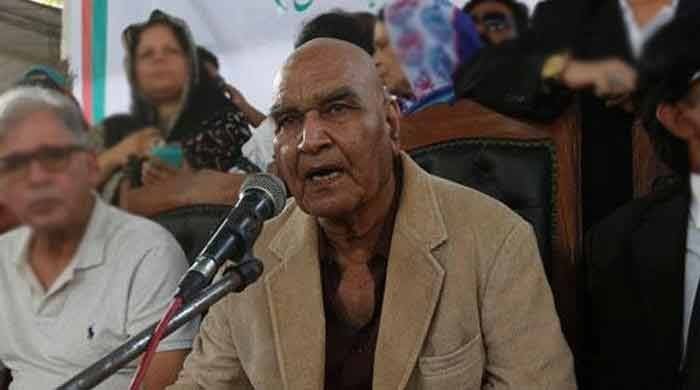

Dr Hasan Zafar Arif, a prominent leftist intellectual and former Philosophy teacher, whose body was found in his car in the city’s suburban area of Rehri Goth on January 13, had been student of the Karachi University (KU) in the late 1960s. At KU, he was the unit secretary of the National Students Federation. After securing a full scholarship, Arif went to England to pursue his PhD from the University of Reading, where he became associated with various Marxist groups.
After coming back to Pakistan in 1973, he joined the KU as an assistant professor at the Philosophy Department. Arif along with leftist leader Muhammad Mian became associated with the Mazdoor Kisan Party.
He remained active in campus politics and served as the president of varsity’s teacher body. Tausif Ahmed Khan, a senior journalist, says that Arif as a teachers’ leader "led the campaign for securing permanent contracts for temporary teachers through organising strikes and protests. He also went for post-doctoral research at the Harvard University".
Aslam Khwaja, in his recent book People’s Movements in Pakistan, writes that during Ziaul Haq’s dictatorship, Martial Law Administrator Sindh, Jehandad Khan sent a show-cause notice to Arif, accusing him of involvement in political activities and instigating students to quit the Islamic way of life. Instead of replying to the notice, Arif issued a public statement, questioning the gentleman’s authority in issuing such a notice. "Within no time, he was arrested and detained for three months in Karachi Central Jail. His detention was extended till April 1986, when finally he was released; during his detention, he was removed from the University job and his family was forcefully evicted from the campus residence," he writes.
After the PIA plane hijacking case in 1981, the Islami Jamiat-e-Talaba (IJT)’s militant wing named ‘Thunder Squad" in the KU started threatening the progressive student groups. Arif was the brain behind the organisation of the United Students Movement, a student groups’ alliance against the IJT.
After dismissal from the KU varsity, Arif started campaigning for rights of Karachiites right under the banner of the Karachi Shehri Mahaz. Dr Riaz Ahmed, a university professor and political activist, says that Arif had published a booklet on Karachi’s civic issues ranging from water to transport and education. "Arif told me once that when the campaign for rights for Karachi residents started gaining momentum, the infamous Bushra Zaidi incident in 1985 happened and the emergence of the MQM exploited all his efforts," Ahmed tells TNS.
Read also: What you can do with a bourgeois education
He also organised the Human Rights Commission of Pakistan Karachi chapter in the 1980s.
Later, when the PPP started facing state oppression during Zia regime, he started working with the PPP and assisted its leader Nusrat Bhutto. He reorganised the party’s youth arms, including the People’s Students Federation and the People’s Youth Organisation, and played a key role in the Movement for the Restoration of Democracy. One of his photographs titled ‘DSP vs PhD’, in which a DSP ranked police officer was seen grabbing Arif in an anti-Zia protest at Karachi’s Regal Chowk, became very popular at that time.
He became disheartened with the PPP’s politics and joined the Shaheed Bhutto faction of the PPP, which he also quit because of ideological differences. Arif also remained part of the Pakistan Muslim League-Nawaz for a brief time.
Later, he left politics and, from the platform of the Karachi Study Circle, started giving lectures and training left-leaning activists and translating Russian publications on Socialist ideology into Urdu.
He also wrote for ‘Research Forum’, an academic journal in Urdu, where, according to Dr Ahmed, he wrote a piece to counter and challenge an argument on prominent Marxist sociologist Dr. Hamza Alvi on the nature of Pakistan capitalism. "Alvi was known as a critical Marxist but Arif was a momentary Marxist," says Ahmed.
Arif disappeared from the public eye for several years but returned on May 15, 2016 when he announced to join the MQM. Arif had never been an MQM member and always opposed the party’s ‘fascist’ politics in the 1980s, according to one of his colleagues.
However, after almost three months, the situation became worse for him and his new party. After the August 22, 2016 diatribe of the party founder Altaf Hussain against the country and incitement of party workers to attack media houses, majority of Pakistan-based leaders of the MQM under the headship of Dr. Farooq Sattar had no option but to announce complete dissociation with its London leadership, especially Hussain.
In this situation, when most of his loyalists left the party and law enforcement agencies were ready to arrest anyone who has any sort of affiliation with the MQM-London faction, Hussain assigned the toughest task to Arif -- to run the party in Sindhs’s urban centres, especially Karachi. On October 14, 2016, he was made a member of 12-member interim Rabita (coordination) committee. He also went for jail for several months last year. However, according to an MQM-London activist, Arif and Qasim Ali Raza were two leaders who were tasked to organise the party.
Apart from leaders of different factions of the MQM who expressed their shock over his mysterious ‘death’, the PPP Chairman Bilawal Bhutto-Zardari tweeted that he was "deeply disturbed by the murder" of Prof Arif. Soon after his tweet, the Sindh government appointed DIG-East Sultan Ali Khawaja as inquiry officer to conduct a probe into Prof Arif’s death. Police investigators remain clueless about Arif’s mysterious death.
His daughter Shehrazade has asked the public to believe he died from natural causes. "Certain people are trying to exploit his death for their own political agenda, while others are, out of a sense of love and admiration of him, trying to seek justice for what they believe to be a crime," she wrote on Facebook.